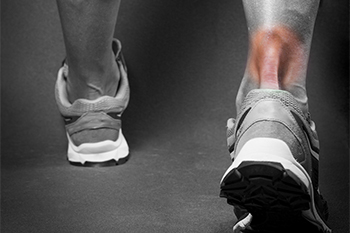May 2023
Facts About Achilles Tendon Ruptures

Pain in the back of the heel often indicates a problem with the Achilles tendon, and there are numerous ways this can occur. The top three risk factors for tearing or rupturing this strong tendon are training too hard, pushing off the ground with great force, or a rapid change of direction. While these factors are mainly related to athletic activities, many others can contribute to an Achilles tendon injury. Among them are wearing high heels, having tight or weakened calf muscles, and overpronating when you walk or run. Having high arches, aging, and some types of arthritis can also put you at risk. Ankle instability, taking certain antibiotic medication, and changing the type of surface for an activity are additional risk factors. If you are experiencing any form of ankle pain in the back of the heel that inhibits the completion of your daily activities, it is suggested that you make an appointment with a podiatrist who can discover the cause and treat it.
Achilles tendon injuries need immediate attention to avoid future complications. If you have any concerns, contact Naim G. Shaheed, DPM of Ankle and Foot Centers of Georgia. Our doctor can provide the care you need to keep you pain-free and on your feet.
What Is the Achilles Tendon?
The Achilles tendon is a tendon that connects the lower leg muscles and calf to the heel of the foot. It is the strongest tendon in the human body and is essential for making movement possible. Because this tendon is such an integral part of the body, any injuries to it can create immense difficulties and should immediately be presented to a doctor.
What Are the Symptoms of an Achilles Tendon Injury?
There are various types of injuries that can affect the Achilles tendon. The two most common injuries are Achilles tendinitis and ruptures of the tendon.
Achilles Tendinitis Symptoms
- Inflammation
- Dull to severe pain
- Increased blood flow to the tendon
- Thickening of the tendon
Rupture Symptoms
- Extreme pain and swelling in the foot
- Total immobility
Treatment and Prevention
Achilles tendon injuries are diagnosed by a thorough physical evaluation, which can include an MRI. Treatment involves rest, physical therapy, and in some cases, surgery. However, various preventative measures can be taken to avoid these injuries, such as:
- Thorough stretching of the tendon before and after exercise
- Strengthening exercises like calf raises, squats, leg curls, leg extensions, leg raises, lunges, and leg presses
If you have any questions please feel free to contact one of our offices located in Lithonia/Stonecrest and Emory/Midtown, GA . We offer the newest diagnostic tools and technology to treat your foot and ankle needs.








